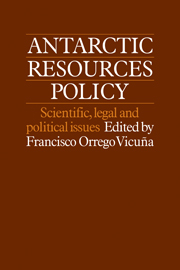Book contents
- Frontmatter
- Contents
- List of contributors
- 1 Antarctic resources policy: an introduction
- Part one The state of Antarctic knowledge and experience
- Part two The policy for the conservation of the living resources of Antarctica
- Part three The policy for the exploration and exploitation of the mineral resources of Antarctica
- 11 Geologic data and its impact on the discussion on a regime for mineral resources
- 12 Basic conditions for the exploration and exploitation of mineral resources in Antarctica: options and precedents
- 13 Oil as a special resource: problems and experiences
- 14 An overview of the problems which should be addressed in the preparation of a regime governing the mineral resources of Antarctica
- 15 The definition of a regime on Antarctic mineral resources: basic options
- 16 Criteria for access to the resources of Antarctica: alternatives, procedure and experience applicable
- Part four Issues on Antarctica and the law of the sea
- Part five The policy for Antarctic cooperation
16 - Criteria for access to the resources of Antarctica: alternatives, procedure and experience applicable
Published online by Cambridge University Press: 06 July 2010
- Frontmatter
- Contents
- List of contributors
- 1 Antarctic resources policy: an introduction
- Part one The state of Antarctic knowledge and experience
- Part two The policy for the conservation of the living resources of Antarctica
- Part three The policy for the exploration and exploitation of the mineral resources of Antarctica
- 11 Geologic data and its impact on the discussion on a regime for mineral resources
- 12 Basic conditions for the exploration and exploitation of mineral resources in Antarctica: options and precedents
- 13 Oil as a special resource: problems and experiences
- 14 An overview of the problems which should be addressed in the preparation of a regime governing the mineral resources of Antarctica
- 15 The definition of a regime on Antarctic mineral resources: basic options
- 16 Criteria for access to the resources of Antarctica: alternatives, procedure and experience applicable
- Part four Issues on Antarctica and the law of the sea
- Part five The policy for Antarctic cooperation
Summary
Scope of this presentation
The title of this address is so wide that it could encompass the totality of the elements which could go to make up a regime for the exploration and exploitation of minerals in Antarctica. I shall approach the problem from a more limited standpoint. I shall outline what I believe are the main international political realities which have to be taken into account in working out a regime and the areas in which accommodation might be possible.
In examining these problems, I shall make certain assumptions. I shall assume that the international instrument which is to be drafted will take the form of a Convention; that the Convention will lay down how environmental standards are to be set, how the conditions of access by operators are to be determined, who is to issue licences, who is to police the conditions of licences and the revenues to be collected. I shall assume that there will be some kind of Commission, or Commissions, perhaps with subordinate bodies, and that there will be a body for tendering scientific and technical advice. I do not propose to discuss the composition or procedures of such bodies. Finally, I assume that all the elements in Recommendation XI-1 will find their way into the Convention. If, therefore, I do not refer to a particular element in Recommendation XI-1, it is not because I disagree with it or have overlooked it, but rather that I believe that its acceptance is common ground.
- Type
- Chapter
- Information
- Antarctic Resources PolicyScientific, Legal and Political Issues, pp. 217 - 228Publisher: Cambridge University PressPrint publication year: 1983
- 3
- Cited by



